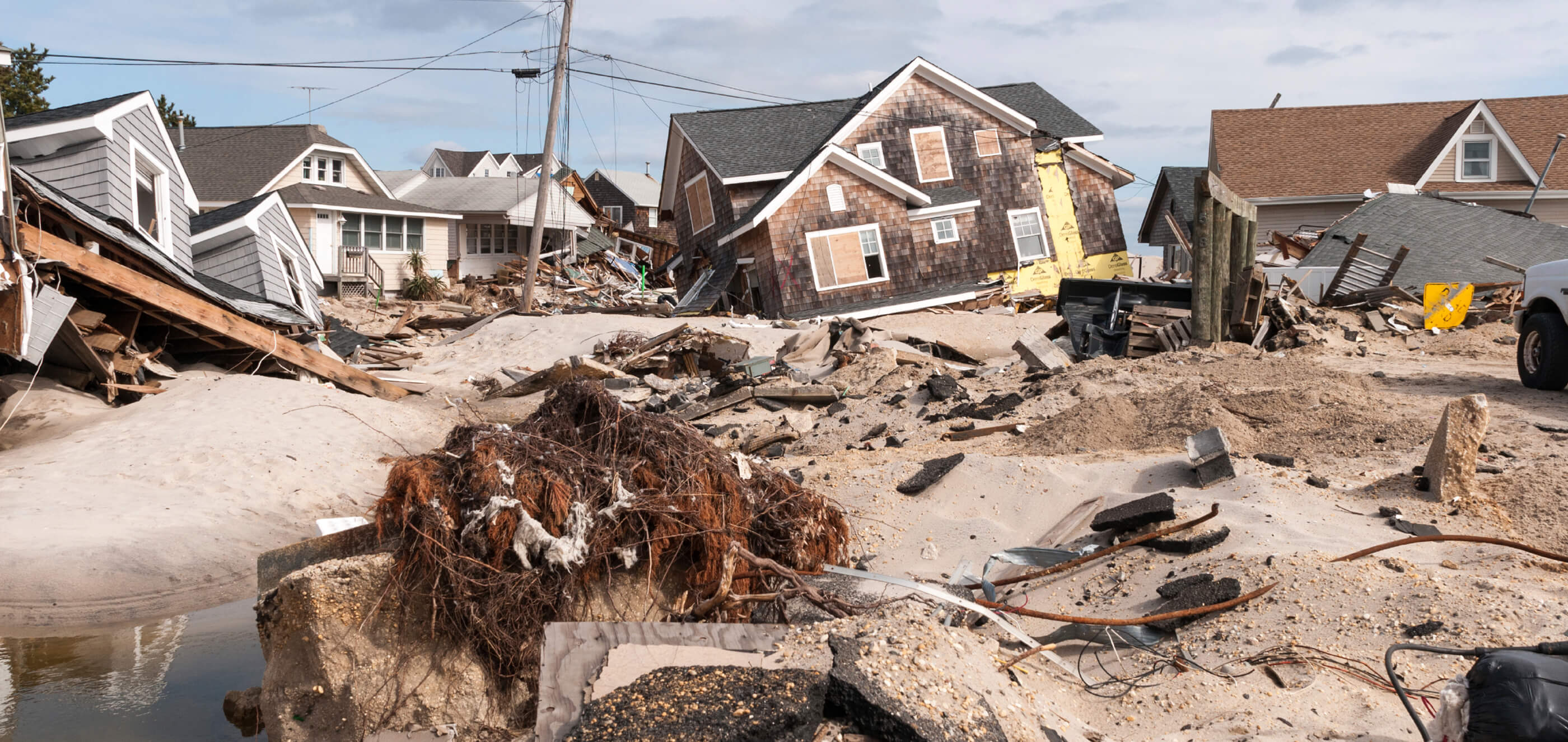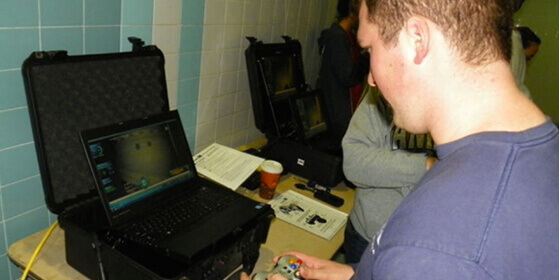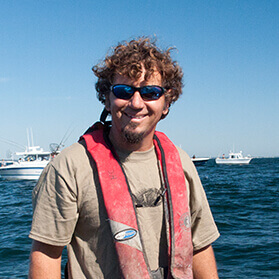
Urban Coast Institute
Exploring the Environment to Protect Our Coasts
Making a plan to rebuild a resilient New Jersey coast in the wake of Superstorm Sandy by safeguarding our natural resources.
The Urban Coast Institute Charts a Course Forward
On the morning of October 30, 2012, residents of the Jersey Shore woke to sand-laden streets, downed power lines and bridges, scattered boats, and persistent floodwaters. The lucky ones were only left without power—many for more than a week—but with their homes dry and intact. The less fortunate scrambled to find a safe haven after suffering total property loss, while others desperate for basic medical care sought refuge in local emergency shelters—including the one at the OceanFirst Bank Center on the Monmouth University campus.
When Superstorm Sandy accelerated toward the Eastern seaboard with winds stretching for more than a thousand miles before making landfall just south of Atlantic City, it left more than 130 dead and damage estimates topping $70 billion in its wake. The coastline was ravaged, and the ecosystem was turned upside down.
Less than two months later, Monmouth University hosted the conference, “Rebuilding a Resilient New Jersey Shore.” Sponsored by New Jersey Future, the Monmouth University Kislak Real Estate Institute, and the Monmouth University Urban Coast Institute (UCI), the event marshaled the opinions of professors, planners, scientists, architects, government officials, and others to learn how communities can cope with the decade-long recovery effort, and how to better prepare for the inevitable next storm.

UCI students practiced using Remote Operated Underwater Vehicles (ROVs) in the pool for a few months, and then took them to Sandy Hook and the Raritan Bay to help clean debris left by Superstorm Sandy, including marine debris like lost lobster pots and crab traps.
“There are events where we vividly recall in our lives where we were and what we were doing. This was one of those times,” said Peter Reinhart, director of the Kislak Real Estate Institute and chairman of the Board of New Jersey Future.
UCI Director Tony MacDonald emphasized the urgent need for a stronger community that day. “It’s about building better, not just rebuilding,” MacDonald said, adding that the push for a multi-agency response from both the private and public sectors is imperative.
His passion as a protector of the environment and his proactive approach to accomplishing his goals have not waned since then.

Chris Wojcik
B.S. in Biology, ’91
President/Creative Director of Animal Exhibits and Design
“When I look back at my time at Monmouth, I fondly remember it for all of the lifelong friends that I made, the perspectives that I gained, and, of course, for the outstanding science education that was imparted to me by my professors. I feel as though I left Monmouth on a rock solid footing.”
Since 2005, the UCI has been a staunch supporter of the public interest, serving as a forum for research, education, and collaboration in the development and implementation of science-based policies and programs. The UCI supports the stewardship of healthy, productive, and resilient coastal ecosystems and communities.
The UCI, a Center of Distinction, builds on the University’s growing strengths in environmental science, business, economics, and public policy, and collaborates with the faculty and students of all disciplines on projects that relate to its mission.
On an already densely populated coastline, development continues to grow in New Jersey. Although this development is beneficial to the economy, it also places significant strains on already stressed coastal ecosystems and places an increasing number of people at risk from coastal hazards.
The UCI seeks to balance these demands by educating the public about how better to initiate and steward policy change to ensure natural resources are protected.
“All the communities are facing big questions and challenges about how we retain everything we love about the Jersey Shore, but also make sure that we’re planning for the future,” said MacDonald.
“We can take some of the studies concerning the health of the Barnegat Bay, or the New York Harbor Estuary Program, and we can sit down with the communities, and say, ‘What can they do differently at the local level that can have a positive influence on their environment?’” he added.
In an effort to broaden its scope and carve out significant change in environmental policy and sustainability, the UCI exceeded a $5 million challenge grant in 2014 to support a new marine science and policy initiative. The challenge grant, which was the first of its kind for the UCI and one of the largest for the University, has since funded infrastructure improvements that positioned Monmouth’s marine programs and the UCI to flourish in the future. The grant has also funded new faculty positions, several scholarships and innovative student research projects each year, and a research partnership with The Rockefeller University on topics including ocean exploration, marine environmental DNA and the impacts of noise in the ocean
“We have to invest in the coast,” said MacDonald, who added that the UCI’s top priority is coastal and ocean policy and management.
The UCI also received over $2 million in grant funding from the Gordon and Betty Moore Foundation to continue its work over two years to engage ocean stakeholders in the region in the development of the Mid-Atlantic Ocean Data Portal.
The Portal provides state-of-the-art mapping and visualization tools to better understand the ocean, reduce potential conflicts, and support regional ocean planning in collaboration with the Mid-Atlantic Regional Council on the Ocean (MARCO) and the Mid-Atlantic Committee on the Ocean.
The UCI continues to stay on the cutting edge with three research vessels, including the 49-foot R/V Heidi Lynn Sculthorpe, and sophisticated sonar and hydrographic mapping equipment.
With these tools available, MacDonald stresses the importance of education: “Since we’re a mile from the shore, it is a great place to study marine science and to study the real environment.”
Jim Nickels, marine scientist for the UCI, teaches courses in maritime archaeology and marine science field methods.
“The students are not only learning about marine biology, but they’re actually learning how to study in the field, which is fantastic,” said MacDonald.
Looking ahead at the next 10 years, MacDonald said, “Flooding is a huge issue, has always been in New Jersey. That gets worse as you increase impervious surface, and increase development upland in the watershed. How much development can we sustain, and also sustain the environment? We have some big challenges.”
“I do think you see a change in the next generation to think about how to live sustainably on an individual basis, how to live sustainably in their community, and at Monmouth we increasingly are asking students to have a global perspective. How are we going to have a sustainable world in the future?”
This video contains footage the students took of the wreck of two 1800s locomotives discovered off the coast of Long Branch – just six miles from our campus.
